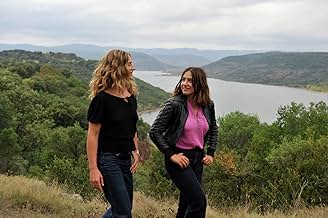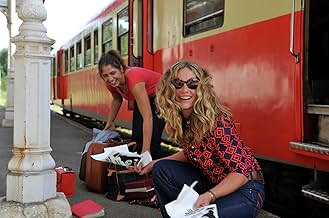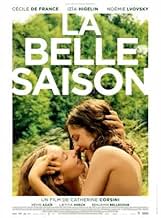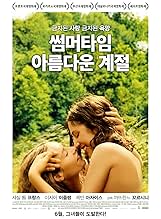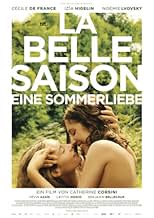IMDb रेटिंग
6.7/10
6.1 हज़ार
आपकी रेटिंग
1970 के दशक के फ्रांस में सेट किए गए इस नाटक में एक युवती फ्रांसीसी ग्रामीण इलाकों से पेरिस चली जाती है और एक नारीवादी नेता के साथ एक भावुक प्रेम संबंध शुरू करती है.1970 के दशक के फ्रांस में सेट किए गए इस नाटक में एक युवती फ्रांसीसी ग्रामीण इलाकों से पेरिस चली जाती है और एक नारीवादी नेता के साथ एक भावुक प्रेम संबंध शुरू करती है.1970 के दशक के फ्रांस में सेट किए गए इस नाटक में एक युवती फ्रांसीसी ग्रामीण इलाकों से पेरिस चली जाती है और एक नारीवादी नेता के साथ एक भावुक प्रेम संबंध शुरू करती है.
- निर्देशक
- लेखक
- स्टार
- पुरस्कार
- 3 जीत और कुल 8 नामांकन
Cécile de France
- Carole
- (as Cécile De France)
Natalie Beder
- Marie-Laure
- (as Nathalie Beder)
फ़ीचर्ड समीक्षाएं
LGBT rights are more relevant than ever. In several countries, unfortunately, the trend is towards more difficult living conditions for gays and transgender people. Seen in such a perspective, the plot of this film remains relevant, despite the fact that it depicts a summer in 1971.
Although perhaps the problem here is something we have seen in many films, the film is experienced as both engaging and well told.
I sat thinking when I saw this movie; how many such fates exist? Both before and now? That people cannot live their lives to the fullest, in fear of condemnation from their surroundings. There are probably a lot of them, and in that way such films become important and unfortunately relevant. For such films we need. We need to be reminded of how the world treats and views queer people. In addition to a strong and pointed action, the film is also beautifully filmed, well directed and with good actors who get both convincing and engaging.
An enjoyable film, with some great performances; but less travelled country roads should be rather more bumpy.
While a far from novel story, the three female leads (Izïa Higelin, Cécile de France and Noémie Lvovsky) give pitch perfect performances.
Where this film falls down is in giving the two lovers, far too smooth a ride. If you're fighting for freedom, surely the establishment would offer far more resistance? Here, the revolutionaries hardly seem to experience any push-back. There's one bump in the road, but that's really it.
While a far from novel story, the three female leads (Izïa Higelin, Cécile de France and Noémie Lvovsky) give pitch perfect performances.
Where this film falls down is in giving the two lovers, far too smooth a ride. If you're fighting for freedom, surely the establishment would offer far more resistance? Here, the revolutionaries hardly seem to experience any push-back. There's one bump in the road, but that's really it.
'La Belle Saison' is set in 1971 when women were asserting their rights – as indeed a lot of folk were doing the same to a world that was not really ready. This is set against the lives of Delphine from a rural farming family. She escapes to Paris where she happens to cross paths with the fiery Carole (Cécile de France – 'Meserine').
Then amidst the heady cocktail of feminism, liberation and radical politics they expressed themselves sexually – which of course was revolutionary. Yes they set about challenging the heterosexual orthodoxy - and found more than just a political statement in that they fell for each other.
Now there is tons more to this inspiringly brilliant film. It is made in such a way that the characters come alive and are completely believable. All the performances are outstanding and the period detail is really good too. The hair and fashions as well as the vehicles are spot on – and some nice Janis Joplin songs on the soundtrack too. There is so much here to like that it is a very easy job to recommend.
Then amidst the heady cocktail of feminism, liberation and radical politics they expressed themselves sexually – which of course was revolutionary. Yes they set about challenging the heterosexual orthodoxy - and found more than just a political statement in that they fell for each other.
Now there is tons more to this inspiringly brilliant film. It is made in such a way that the characters come alive and are completely believable. All the performances are outstanding and the period detail is really good too. The hair and fashions as well as the vehicles are spot on – and some nice Janis Joplin songs on the soundtrack too. There is so much here to like that it is a very easy job to recommend.
I didn't much care for the first half of 'Summertime': a posse of beautiful, self-confident and middle-class young feminists assert their right to "to as they please" in the Paris of the 1970s. What is absent from the portrayal is any sense of the personal insecurity that cripples most of us; these sisters, it seems, can quite literally do anything for themselves. The film becomes more nuanced when it follows two of its protagonists (a lesbian couple) back to the farm in the country where one of them (Delphine) grew up, and whence she has now been summoned owing to the illness of her father. There's still some idealisation here: the family own their farm and live a simple peasant life. But the conflict between Delphine's familial and spatial sense of identity, and the new relationship she has forged in the city, is nicely portrayed, as is the guarded hostility of her mother and her local acquaintances to the choices she has made in her new life. Overall, it's not nearly as strong as 'Blue is the Warmest Colour', but it grew on me as I watched it.
This is a sensitive portrayal of two women from different backgrounds in conservative, rural France. Delphine, a country girl in Paris is introduced to feminism at a time (1971) shortly after the student riots in Paris, the bra-burning feminism of late 60s USA, and the teen-led cultural revolution in music, art and fashion. Paris was a world away from her farm in the Limousin. It is a film about feminism and lesbianism with strong female leads directed by an experienced female director who was, herself, a teenager at the time the film was set. As such it is authentic and tender, not titillating. It is a film about relationships, between Delphine and her mother, her Parisian girlfriend, the boy she is expected to marry and above all the conflict between the city and the country.
It is a film that could only be made in Europe and only set in the 70s and was justifiably nominated for a Lumiere, France's equivalent to the Golden Globes. Jellybeansucker should stick to sucking jelly beans and watching simplistic action movies. This is for those who prefer content to pace.
It is a film that could only be made in Europe and only set in the 70s and was justifiably nominated for a Lumiere, France's equivalent to the Golden Globes. Jellybeansucker should stick to sucking jelly beans and watching simplistic action movies. This is for those who prefer content to pace.
क्या आपको पता है
- ट्रिवियाDirector Catherine Corsini stated that she named the two main characters Carole and Delphine after real life artists and feminists Carole Roussopoulos and Delphine Seyrig.
- गूफ़After a swim in the pond, the girls lay out to take some sun. As Carole lays naked on the blanket resting her head on Delphine, her arms are raised and we can see she does not have any underarm hair. As the girls start to kiss and caress Carole's armpit is exposed again but this time full of underarm hair.
- कनेक्शनReferenced in Théo et Hugo dans le même bateau (2016)
- साउंडट्रैकL'Hymne du MLF, d'apres Le Chant des Marais
(Johann Esser/Wolfgang Langhoff/Rudi Goguel)
With the kind permission of Edition Peters Group
All rights reserved
टॉप पसंद
रेटिंग देने के लिए साइन-इन करें और वैयक्तिकृत सुझावों के लिए वॉचलिस्ट करें
- How long is Summertime?Alexa द्वारा संचालित
विवरण
- रिलीज़ की तारीख़
- कंट्री ऑफ़ ओरिजिन
- आधिकारिक साइट
- भाषाएं
- इस रूप में भी जाना जाता है
- Summertime
- फ़िल्माने की जगहें
- Haute-Vienne, फ़्रांस(scenes in the country)
- उत्पादन कंपनियां
- IMDbPro पर और कंपनी क्रेडिट देखें
बॉक्स ऑफ़िस
- बजट
- €48,00,000(अनुमानित)
- US और कनाडा में सकल
- $35,322
- US और कनाडा में पहले सप्ताह में कुल कमाई
- $15,413
- 24 जुल॰ 2016
- दुनिया भर में सकल
- $37,78,938
इस पेज में योगदान दें
किसी बदलाव का सुझाव दें या अनुपलब्ध कॉन्टेंट जोड़ें

![Bande-annonce [OV] देखें](https://m.media-amazon.com/images/M/MV5BMzZiZTVkNWItZGNjYS00ZDY2LWFkOGItZjhkNTk2NDQ3ZDE2XkEyXkFqcGdeQXRyYW5zY29kZS13b3JrZmxvdw@@._V1_QL75_UX500_CR0)


